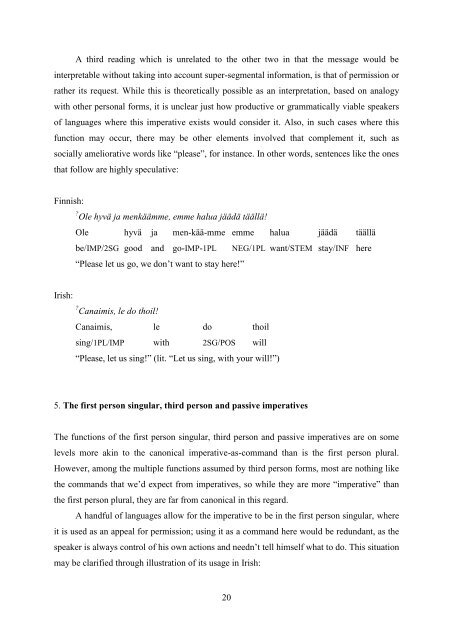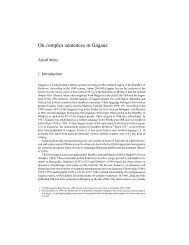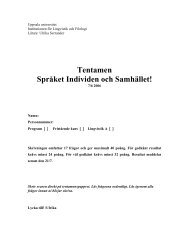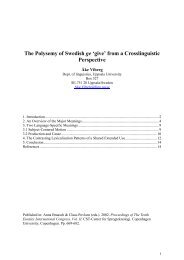The function of non-canonical imperatives in the languages of Europe
The function of non-canonical imperatives in the languages of Europe
The function of non-canonical imperatives in the languages of Europe
Create successful ePaper yourself
Turn your PDF publications into a flip-book with our unique Google optimized e-Paper software.
A third read<strong>in</strong>g which is unrelated to <strong>the</strong> o<strong>the</strong>r two <strong>in</strong> that <strong>the</strong> message would be<br />
<strong>in</strong>terpretable without tak<strong>in</strong>g <strong>in</strong>to account super-segmental <strong>in</strong>formation, is that <strong>of</strong> permission or<br />
ra<strong>the</strong>r its request. While this is <strong>the</strong>oretically possible as an <strong>in</strong>terpretation, based on analogy<br />
with o<strong>the</strong>r personal forms, it is unclear just how productive or grammatically viable speakers<br />
<strong>of</strong> <strong>languages</strong> where this imperative exists would consider it. Also, <strong>in</strong> such cases where this<br />
<strong>function</strong> may occur, <strong>the</strong>re may be o<strong>the</strong>r elements <strong>in</strong>volved that complement it, such as<br />
socially ameliorative words like “please”, for <strong>in</strong>stance. In o<strong>the</strong>r words, sentences like <strong>the</strong> ones<br />
that follow are highly speculative:<br />
F<strong>in</strong>nish:<br />
Ole hyvä ja menkäämme, emme halua jäädä täällä!<br />
Ole hyvä ja men-kää-mme emme halua jäädä täällä<br />
be/IMP/2SG good and go-IMP-1PL NEG/1PL want/STEM stay/INF here<br />
“Please let us go, we don’t want to stay here!”<br />
Irish:<br />
Canaimis, le do thoil!<br />
Canaimis, le do thoil<br />
s<strong>in</strong>g/1PL/IMP with 2SG/POS will<br />
“Please, let us s<strong>in</strong>g!” (lit. “Let us s<strong>in</strong>g, with your will!”)<br />
5. <strong>The</strong> first person s<strong>in</strong>gular, third person and passive <strong>imperatives</strong><br />
<strong>The</strong> <strong>function</strong>s <strong>of</strong> <strong>the</strong> first person s<strong>in</strong>gular, third person and passive <strong>imperatives</strong> are on some<br />
levels more ak<strong>in</strong> to <strong>the</strong> ca<strong>non</strong>ical imperative-as-command than is <strong>the</strong> first person plural.<br />
However, among <strong>the</strong> multiple <strong>function</strong>s assumed by third person forms, most are noth<strong>in</strong>g like<br />
<strong>the</strong> commands that we’d expect from <strong>imperatives</strong>, so while <strong>the</strong>y are more “imperative” than<br />
<strong>the</strong> first person plural, <strong>the</strong>y are far from ca<strong>non</strong>ical <strong>in</strong> this regard.<br />
A handful <strong>of</strong> <strong>languages</strong> allow for <strong>the</strong> imperative to be <strong>in</strong> <strong>the</strong> first person s<strong>in</strong>gular, where<br />
it is used as an appeal for permission; us<strong>in</strong>g it as a command here would be redundant, as <strong>the</strong><br />
speaker is always control <strong>of</strong> his own actions and needn’t tell himself what to do. This situation<br />
may be clarified through illustration <strong>of</strong> its usage <strong>in</strong> Irish:<br />
20
















